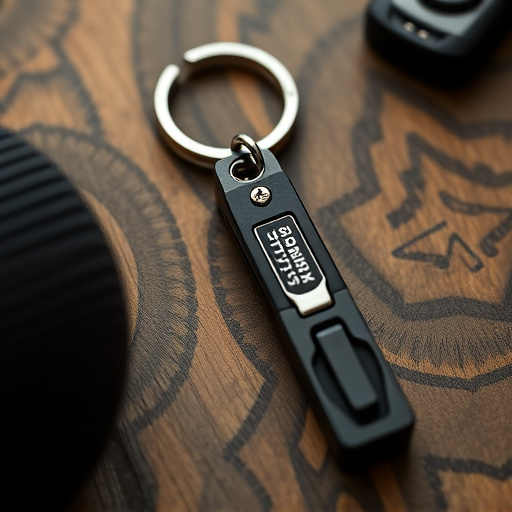Understanding state laws regarding defensive keychains is essential for legal and responsible self-defense. Each state has unique regulations on what constitutes a legal weapon, where it can be carried, and its features. Choosing the best alloys like stainless steel, titanium, or high-quality aluminum ensures durability, corrosion resistance, and performance in diverse environments. These materials offer sharp edges, secure grips, robust locking mechanisms, and compact designs ideal for everyday carry, providing peace of mind and increased safety.
In today’s world, knowing how to defend yourself is crucial. One often-overlooked self-defense tool gaining popularity are defensive keychains. This guide explores the legal carry guidelines for these compact devices in various states. We’ll delve into the best alloys that ensure durability and safety, while also navigating the legal considerations surrounding their possession. Additionally, we offer tips on choosing an effective self-defense keychain to help you make an informed decision.
- Understanding State Laws on Defense Keychains
- Choosing the Best Alloys for Durability and Safety
- Legal Considerations for Carrying a Defensive Keychain
- Tips for Opting for an Effective Self-Defense Tool
Understanding State Laws on Defense Keychains
Understanding state laws regarding defense keychains is a crucial step in ensuring legal and responsible carry. Each state has its own set of regulations, governing everything from what constitutes a legal self-defense weapon to where and how it can be carried. When it comes to keychains designed for defensive purposes, knowledge of local legislation is paramount. Key factors include the material used; the best alloys for defense keychain construction offer both durability and ease of concealment. Aluminum, for instance, is lightweight yet robust, making it a popular choice among those seeking legal self-defense options.
However, not all keychains designed for defensive use meet the criteria set by state laws. It’s essential to know what features are permitted, such as blade length, sharp point design, and overall size. Some states have specific restrictions on the type of metal or the shape of the keychain, so being informed about these nuances is vital. By understanding your state’s legal framework, you can ensure compliance while also gaining peace of mind, knowing that your defense keychain is not only effective but also within the boundaries of the law.
Choosing the Best Alloys for Durability and Safety
When crafting defensive keychains designed for legal carry, selecting the optimal alloys is paramount to ensure both durability and safety. The best alloys for defense keychains should offer superior resistance to corrosion, exceptional strength, and a balance between weight and ease of handling. Stainless steel, for instance, is a popular choice due to its high rust resistance and robust structural integrity. In particular, 304-grade stainless steel, known for its excellent corrosion prevention, makes for an ideal material in challenging environments.
Beyond steel, titanium alloys are also gaining popularity. Lightweight yet incredibly strong, titanium offers enhanced durability without adding significant weight to the keychain. Its natural resistance to corrosion further elevates its appeal for outdoor or rugged use cases. Moreover, certain non-metallic materials like high-performance polymers infused with carbon fiber can provide exceptional strength-to-weight ratios, making them suitable for those seeking lighter defensive keychains without compromising on safety features.
Legal Considerations for Carrying a Defensive Keychain
When considering legal carry guidelines for a defensive keychain, it’s essential to understand local and state regulations regarding self-defense tools. Many jurisdictions have specific laws governing the type, size, and carrying of defensive devices, including keychains. These regulations can vary widely, so staying informed about your rights and responsibilities is crucial.
Choosing the best alloys for defense keychains plays a significant role in their legal status. Alloys like stainless steel, titanium, or high-quality aluminum are commonly preferred due to their durability and corrosion resistance. These materials ensure that your keychain remains reliable in various environments and conditions, enhancing its effectiveness as a self-defense tool. Always opt for quality alloys that meet industry standards, ensuring both legality and performance.
Tips for Opting for an Effective Self-Defense Tool
When choosing a self-defense keychain, consider its effectiveness and reliability. Opting for tools made from high-quality alloys like stainless steel or titanium ensures durability and strength. These materials are resistant to rust and corrosion, making them suitable for frequent use and harsh conditions. Look for keychains with sharp, durable edges designed for quick and efficient defense.
The best alloys for defense keychains also offer excellent grip, crucial for precise control during an emergency. A non-slip surface increases the likelihood of using your keychain as a weapon effectively. Additionally, consider features like a robust locking mechanism to prevent accidental deployment and a compact design that fits easily in your pocket or bag, ensuring you have it ready when needed.
When selecting a defensive keychain, understanding your state’s laws is paramount. Combining this knowledge with choosing the right alloys for both durability and safety ensures you’re prepared while adhering to legal guidelines. Remember, an effective self-defense tool should be easy to carry and use, making the best alloys crucial for reliability in critical moments. Always stay informed about local regulations regarding defensive keychains to remain compliant and secure.
